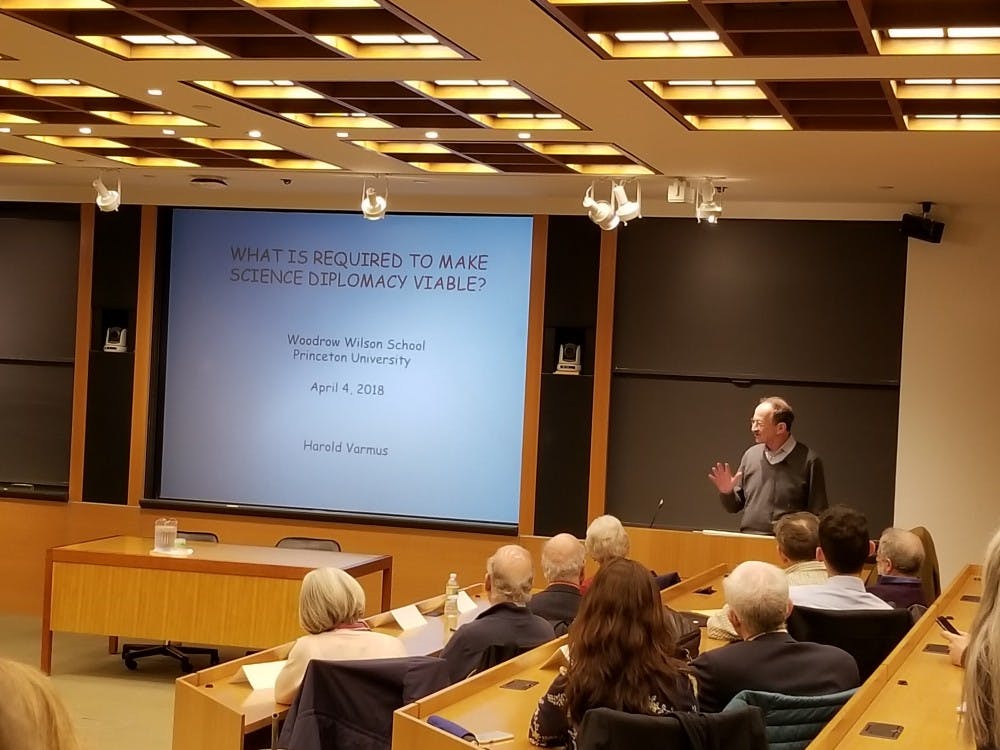On Wednesday, Nobel laureate and former director of the National Institutes of Health Harold Varmus spoke on the intersections of medicine, global health, and international diplomacy.
“Medicine is a public good that is not distributed fairly,” Varmus said to a packed room at the Wilson School. Varmus emphasized the need to use science to improve health around the world through international collaboration and foreign assistance. Varmus highlighted three main factors: research centers in developing countries, federal programs supporting international science, and the issues surrounding the current global science infrastructure.
He began by introducing two research centers as examples of collaboration and assistance: the Malaria Research and Training Center in Bamako, Mali, and the Uganda Cancer Institute in Kampala. Thanks to funding by the U.S. Agency for International Development and the World Health Organization, among others, these centers were able to expand their research interest, develop field stations, and provide leadership and research training to scientists. Unfortunately, in both cases, these organizations suffered from dangers in the form of terrorism and political unrest.
In Mali, long stretches of borders with large terrorist hubs led to the deaths of Americans, Europeans, and Malians. Although French troops were deployed in 2013 to stabilize the region, scientists were still reluctant to return. Despite these challenges, Varmus showed that agencies such as the UCI are crucial to medical breakthroughs and discoveries. Indirectly through the UCI, Sir Anthony Epstein was able to discover and identify the Epstein-Barr virus, a widespread infectious disease that originated from West Africa. However, political upheavals between 1966 and 1985, marked by the tyrannical rule of Ugandan politician Idi Amin, threatened to destroy the UCI. Despite this, generous support from organizations such as the Bill and Melinda Gates Foundation, as well as funding from the Fred Hutchinson Cancer Research Center in Seattle, the Ugandan government, and USAID saved the organization. Varmus remarked that, in light of these difficulties, there is always a great need for well-trained personnel and new approaches to tackling infectious diseases.
Although Varmus described infectious diseases as a natural “resting place” for global health activities, he noted that global health is trending away from tuberculosis, malaria, and AIDS, and is instead now directed at a variety of non-infectious diseases such as hypertension, diabetes, heart disease, and cancer.
“We cannot treat our way out of the cancer problem,” Varmus said, due to a lack of funding and treatment methods. Instead, he drew attention to the need for a balanced and integrated approach to prevention, early detection, and treatment of the disease, which is estimated to cause over 11 million deaths annually by 2030. He argued that we needed measures of trans-disease prevention, namely involving tobacco, obesity, and alcohol. Noting the National Cancer Institute’s assistance in developing registries and national cancer plans, he explained that it was equally crucial to find partner institutions and harness student enthusiasm for global health.
Varmus also criticized the Trump administration’s controversial “America First” stance. Specifically, he pointed out the massive proposed budget cuts to the NIH, USAID, Environmental Protection Agency, Centers for Disease Control and Prevention, and National Science Foundation. He lamented over having an executive branch that “doesn’t seem particularly supportive of science or foreign aid,” adding that although damage is minimal as of now, these plans for detachment and isolation will undoubtedly put global health at risk.
In particular, Varmus stressed the importance of “disseminating knowledge through public libraries,” providing “new methods for online, open-access publishing,” and promoting the “online posting of preprints.” He said that it was essential that there be a freely searchable repository of complete scientific articles and books describing works performed with public funds. Doing so would benefit researchers across the world — particularly in poorer nations — and thus, global health as whole.

Varmus concluded that “international biomedical research is a public good, fosters global health, and warrants support.” Although this is clearly a daunting task requiring government diplomacy, private funding, and highly talented individuals, Varmus said he believes that a “fundamental shift in our attitudes of helping others” is a key step to advancing and revolutionizing global health.
Varmus briefly highlighted his experiences as the director of the NCI, president and CEO of the Memorial Sloan Kettering Cancer Center, and director of the NIH, as well as his experience working with the Multilateral Initiative on Malaria in Dakar, Senegal.
Varmus is currently the Lewis Thomas University Professor of Medicine at Weill Cornell Medicine’s Meyer Cancer Center, a post which he has held since April 2015, and was the co-recipient of the 1989 Nobel Prize in Physiology or Medicine for his work in discovering the genetic bases of cancer.
Varmus’ talk was held on April 4 at 4:30 p.m. in Robertson 016 as the University’s 2018 Gilbert S. Omenn ’61 Lecture in Science Policy.









